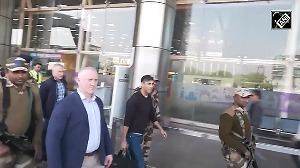What will be saved if the government finally breathes for another two months? If it had fallen, elections would have been held in November-December. Now that it has survived, elections will be held in March-April. But the exercises conducted to buy 60 more days have proved too costly for the nation. We have lost pride in our functional democracy. If democracy is brutalised, who wins?
Maybe the nuclear treaty is a great idea, opposed by 'foolish' Indians unable to comprehend the blessings of Washington, DC. Still, if anything provokes so much of opposition and suspicion, isn't it prudent to have it re-negotiated and decided by the new incumbents of South Block and White House, which is not very far from now?
Sometimes in a democracy many things, considered strongly doable and good by the ruling class are left untouched for lack of a collective will. If that is missing, what is the difference between a Chinese Communist Party's push button single party-no dissidence-rule and a functional Indian democratic mechanism?
However, I have sympathies for the man wrongly in the eye of the storm. Beyond political divide and diatribes, he remains disarmingly unattackable and innocent!
Yes, I must admit, I adored him for his simplicity and coolness. Manmohan Singh's present depressing position reminds me of my first meeting after he took over as prime minister. It was a less than forty minutes meeting at his residence; we had cookies and tea and discussed various aspects of politics including the ideological apartheid.
'I don't believe in it,' he said, and looked straight into my eyes. I knew he was serious and meant every word he said -- otherwise I wouldn't have been ushered into meet him. He said that he respected different viewpoints, even if he didn't agree completely. Hence, leaders likes Atalji, Advanji had a high place in our public life and he would like to build a nation free from animosities and hatred. I loved him saying so.
I asked a couple of questions about improving India's economic condition and focusing on the poor and he was very clear, optimistic and affable. In the end, I ventured to suggest that he should give a grand vision for a resurgent India -- 'Maybe, if it pleases you, you may like to use the phrase -- Nav Bharat Nirman Yojana for a grand poverty eradication plan.' He smiled and said it was a good name. And we parted.
Before meeting him and after the brief chat, I met my top two leaders and briefed them, so that there should not be any misgiving. I decided to publish my discussion with the prime minister in a positive way -- without any colour or additions, as perhaps my colleagues in the profession expected, since I belonged to the opposite camp of the ideological divide.
I was completely floored by the simplicity and straight forwardness of the man I always held in high esteem. Hence the entire discussion was published, with his office's permission of course.
In the RSS we were clear -- all governments belonged to us and unless they proved themselves untrustworthy, trust them without malice. So did I.
The day my brief chat with him hit the news stand, an entirely extraordinary furor was created by the secular media. Why has the prime minister given an interview to a RSS person? For the next seven days, the media attacked the prime minister and his office, as if they had committed a Constitutional blunder for which they must be tried.
Sushma Swaraj defended while Jayanti Natarajan tried to do a balancing act. A couple of months later, I met the PM at a party at his residence. Dr Singh was cool. I said, I felt sad to see all this but he replied, don't worry, nothing wrong has been done. Only a decent person could have done that.
The next time I met him was at the residence of Shri L K Advani where he had organised a recitation (paath) of Guru Granth Sahibji. That too was a nice gesture indeed. We have had a number of lacklustre prime ministers, but this can't be mentioned about them.
I admired his capability and patience to go on tour of Japan for improving bilateral relations. It was a very important visit as he, being an old Japan hand highly respected in that country, must have known if missed this time, another opportunity could be too far away.
It is unfortunate we have to create enemies to flower in politics. The uncharitable remarks he receives from a section of the press are hardly bought by the general public. His biggest asset is his sincerity. And even sincere people have their share of failures. There is anger against price rise, general loosening of the State authority and a sense of no-governance.
But for that, the media and the great stalwarts are really afraid and terrified to blame the real super prime minister. Manmohan Singh is an easy target; he can be assaulted in newspapers, caricaturised without any fear of revenge. But have you ever seen the real remote controller of the governance -- who likes to accept the Olympic Games invite instead of sending her prime minister to represent the country -- getting the media focus of criticism?
What is the balance-sheet of his governance? Is it good to allow such vicious and nauseating horse-trading of the so-called honourable Members of the Parliament?
When the government was sworn in, the media was singing paeans to Sonia's 'qurbani', sacrifice and gave her a 'devi' like image. Now what's the scenario? The plot is thickening by the day, the 'devi' is nowhere to be seen, and Parliament is being compared to a mandi. Below the belt attacks remind us what India would have been in the pre-East India Company era. It is sickening to read the morning newspapers these days.
No government has had such a dismal and disappointing record like the UPA. Not a single major infrastructure task was implemented earnestly -- work on the Golden Quadrilateral was abysmally slowed down, energy requirements were not met, (forget the US treaty -- even if inked today, it would give us the first spark of energy 20 years later), farmers committed suicide from Andhra to Punjab and the monetary relief announced helped banks alone.
The prime minister has had no control over his ministers -- they were all briefed by Sonia Gandhi and took orders from her.
More than the real executions of the plan and programme, it is perception that decides the fate of a government. Atal Bihari Vajpayee's image was that of being bright, futuristic, hard on terror, amenable and a democrat who controlled the government. Manmohan Singh, on the other hand, seemed to be standing on two stools, looking backwards towards 10, Janpath every time he announced anything big.
That was not the image Indians had voted for. We had voted for a prime minister, not a dictation taker from someone else. My sources say, he was against the Ram Sethu destruction, but couldn't help it. He was against Arjun Singh's communal schemes, but couldn't even discuss the matter. He was trying to do so many things but you know, madam...
So, then why didn't he resign? At least he could have enhanced the honour and the prestige of the seat he was occupying. Manmohan Singh will go down in history as a prime minister who liked to be known as a nice person, impressed NRIs more than Indians but was not genuinely recognised as the real prime minister.
The humiliations he suffered in silence were too many. What was the compulsion for him to stay on and feel helpless? Did he ever want to assert his authority? I doubt. He always felt too obliged to be nominated as prime minister and enjoyed it too. At best, he remains a headmaster who tried to do most of the homework for all the brats himself and dared not to instruct his juniors to behave.
He is good to his party, loyal to his leader and takes criticism in his stride. So what if you don't agree with him at all? Tighten your loins and let democracy win.
The views expressed are personal.






 © 2025
© 2025